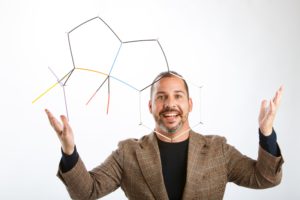Luis Miguel Azofra (Ramón y Cajal Fellow) loves Quantum Chemistry as much as the sea. The latter was a gift he received for being born in the Canary Islands, the first is a passion he learned during his PhD in Prof Alkorta’s lab (CSIC, Spain). In 2015, Dr Sun and Prof MacFarlane introduced him to the field of catalysis (Monash University, Australia), and in 2016 he joined Prof Cavallo’s group as an in-silico designer (KAUST, Saudi Arabia). Currently, Dr Azofra is an early-career research leader at Universidad de Las Palmas de Gran Canaria, where he combines his efforts as a researcher and lecturer.
Find out more about Luis Miguel Azofra’s work on his webpage
Read Luis Miguel Azofra’s Emerging Investigator Series article, ‘Competition between metal-catalysed electroreduction of dinitrogen, protons, and nitrogen oxides: a DFT perspective’, DOI: 10.1039/D2CY00389A and check out our interview below
How do you feel about Catalysis Science & Technology as a place to publish research on this topic?
Catalysis is amongst the broadest topics in chemical research and we, the researchers, need spaces that host these findings. In this aspect, CS&T is a point of reference to communicate your research in catalysis. But in addition, it is a point of reference to learn about the extensive outstanding research in the catalytic field that is carried out all over the world. Broad scope, high-quality research, exhaustive peer-review process, and endorsed by the Royal Society of Chemistry. I think this says it all.
What aspect of your work are you most excited about at the moment and what do you find most challenging about your research?
Well, I have been quite lucky to have been doing research in some of the most important leading R&D centres across the world during my PhD and postdoc stages. Undoubtedly, the experience gained over the years has allowed me to have achieved the highest goal that a researcher in Spain can dream of, that is, being awarded the Ramón y Cajal research fellow in chemical sciences. It will be five years of intense research activity in which I will dedicate significant efforts into two areas of great current interest, which are the development of second-generation catalysts for the synthesis of green ammonia and the revisiting of the light-assisted organometallic chemistry for the transformation of organic molecules with applications in fine chemistry.
In your opinion, what are the most important questions to be asked/answered in this field of research?
Wow! For the first, the challenge is undoubtedly the searching of novel materials capable of suppress the generation of hydrogen in favour of the transformation of nitrogen into ammonia and doing it in good yields and production rates. I strongly believe that the theoretical research has much to say in this topic, not only explaining the reaction mechanisms fitting to the experimental results of our colleagues working in the lab, but also predicting prior-to-synthesis behaviours. In this concern, it seems that all efforts should be put into what it seems the best strategy developed so far, i.e., the lithium-mediated nitrogen reduction process. How much remains to be done in optimising the reaction? Can the catalyst be improved with structural modifications? Is there something better beyond lithium? These are some of the questions to which we will have to seek answers. Concerning the second, in recent years, remarkable advances have been described with outstanding investigations at the experimental level. And I say it, because I just attended to the 2023 KAUST Research Conference where some of the most prominent researchers in the field have attested it with their terrific and outstanding presentations. In my opinion, at theoretical level there is little support, so much remains to be done, not only at the level of research production but also in terms of nuts and bolts.
Can you share one piece of career-related advice or wisdom with other early career scientists?
“Ancora imparo”, this is the motto of MonashUni, one of my former institutions. It means ‘I am still learning’. So, always have to be learning, be thirsty to learn new techniques, introduce yourself to new topics, set yourself new challenges, never give up, surround yourself with good professionals, do not want to be better than others but every day give the best version of yourself and, of course, enjoy your life —we only have one.
Follow Luis Miguel Azofra on Twitter @Azofra_LM to keep up to date with his latest research











